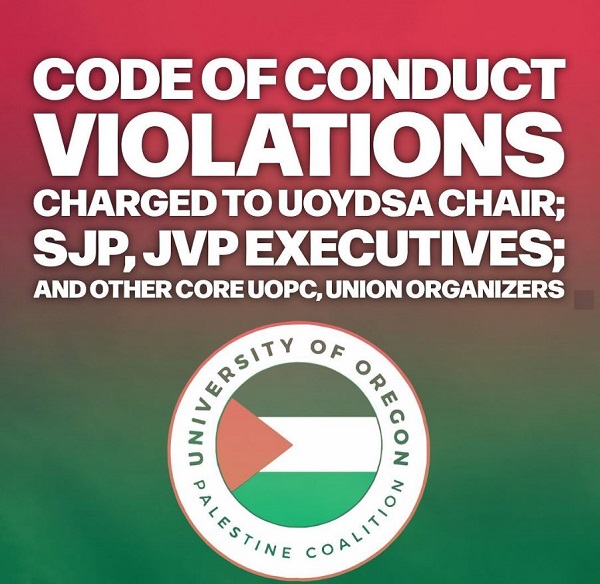Student activism is a vital component of higher education
4 min read
|
Getting your Trinity Audio player ready...
|
from UO Faculty & Staff for Justice in Palestine (UOFSJP)
For the second time this year, the UO administration has charged a group of student protesters and leaders for alleged violations of the Student Code of Conduct. Threatening to expel or suspend student activists for “amplified sound” and “unauthorized events” is an undeniably extreme and unjustified action on a campus that has long celebrated its commitment to social justice and student advocacy.
As Faculty and Staff of the University of Oregon, we view these charges—and the general lack of fair process which has thus far accompanied them—as a transparent attempt to intimidate student protesters in order to systematically suppress student speech on campus.
The UO administration must immediately and publicly reverse course on these charges and the related policies, which were implemented without any public consultation from elected student leadership, the University Senate, or campus labor groups.
In the most generous interpretation, the selective enforcement of these policies is absurdly subjective — to a degree that reflects a concerning lack of foresight. The UO has chosen just a few students for punishment out of huge crowds, assigning seemingly arbitrary guilt to some participants and not others.
Moreover, the vague rule against sound that “annoys/disturbs” a “reasonable” person apparently applies to one protester’s use of a bucket drum — but not to student musicians practicing on the lawn, or to sporting events like the UO’s ESPN Game Day broadcast (which created an awful lot of “annoying” and “disturbing” sound).
In the least generous interpretation, these policies and charges are warning signs of a rapidly deteriorating campus climate — especially alarming in light of Trump’s threats to quash free speech on campuses and to deport protesters whom he considers to be terrorists.
Trump has publicly speculated upon all kinds of potential actions, from national healthcare bans, to mass deportations, to eliminating the Department of Education. Will President Scholz expel students for protesting these issues too loudly too? Will he threaten to expel (and effectively deport) international students here on student visas?
Eerie echoes of Trump-style rhetoric often appear within UO’s communications about anti-war protesters, too. In a May 10 email, President Scholz conflated students protesting genocide with the militant group Hamas. In a more recent email, the UO falsely implied association between anti-Semitic hate incidents on campus and a completely unrelated anti-war pamphlet.
New flyers entitled “Responding to Threats” have also started appearing across campus. These guides lump “activists/protesters” in with threatening calls/emails and suspicious packages, directing readers to contact the police if they feel threatened by protesters.
Moreover, minor student conduct charges against UO protesters are now being handled by the Office of Risk Management, implying that student activism itself is a threat.
This kind of messaging actively puts our students (particularly students of color) at risk by
- Inviting outsiders to connect them with unfounded claims about “terrorists” and/or hate groups, and
- Inviting heightened policing and surveillance against students under the guise of “safety.”
We would hope that President Scholz would know better than to use these tactics against student activists, given that he graduated from Stanford University — a campus that was undeniably made better by a rich history of student protests. In 1966, Reagan endorsed a similar strategy to UO’s current approach when he suggested that code of conduct charges could be used to systematically suppress student protests against the Vietnam War (protesters whom he privately referred to as “trash” and “filthy”). Reagan later shut down 28 California campuses in order to halt anti-war protests, and then worked for years to price out poor students from higher ed because he believed an “educated proletariat” was dangerous.
Will you claim a similar legacy in your pursuit of a quieter campus, President Scholz? How can the UO claim to be an “agent of change and innovation” while actively suppressing and distorting calls for change?
Far from being a “disruption” to education or a “risk” to the campus, student activism is an asset to our collective betterment and a vital ethical component of higher education.
We owe the existence of entire academic departments to student protesters of the past, who we can thank for programs like Indigenous, Race, and Ethnic Studies and Black Studies here at UO. More recently, last year’s pro-Palestine student protests can be thanked for UO’s new faculty hires in Middle Eastern Studies and expanded scholarships for Palestinian students. These outcomes clearly benefit our whole community.
Given that the UO has historically practiced an overabundance of caution in protecting actual hateful speech on campus — from homophobic preachers, to anti-abortion extremists, to instigators from Turning Point USA who film and harass students — we find it beyond disappointing that the UO has decided that anti-genocide protests are a bridge too far.
That history is also part of why it is so troubling that the UO has specifically targeted Palestinian and Jewish student leaders who are rightfully raising issues of apartheid and genocide on our campus. In particular, the safety, wellbeing, and inclusion of Palestinian students amid the most well-documented genocide in history seems to be a complete non-priority for the UO.
As Faculty and Staff, we stand in solidarity with our courageous students who continue to protest genocide in spite of President Scholz’s threats to take away their education over “annoying” sounds and demonstrations. Speech, protest, and academic freedom must be protected on our campus, particularly when students are speaking to something as morally urgent as a genocide.
We demand that President Scholz reverse course on the arbitrary enforcement of conduct policies meant to suppress protest and speech on campus.
President Scholz: Don’t punish students for paying attention during their lessons on human rights. Choosing to protest a genocide is evidence of a good education. Our students are teaching us.




